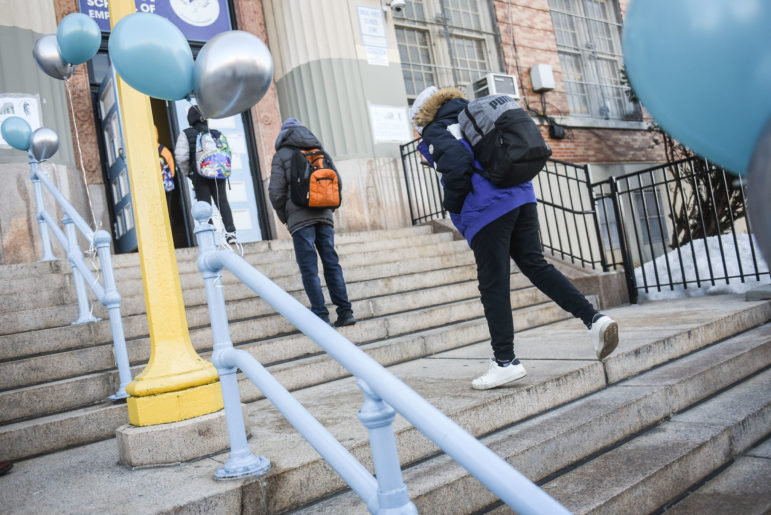
Flickr/Warren LeMay
A Polish national was detained after arriving Newark Airport for overstaying a previous visa. (Credit: Flickr/Warren LeMay) Read the original story in Polish at Nowy Dziennik
Translated and condensed by Aleksandra Slabisz
“Visa-free entry to the U.S. is one big hoax. Once you have outstayed your visa in the past, don’t waste your time and money trying to visit America, unless you want to see what a U.S. jail looks like at night,” writes Polish national Ewa on Facebook, where she also posted pictures from a detention center. In an interview with Nowy Dziennik, Ewa admits that she was aware she had broken U.S. immigration law by overstaying her visa, but did not expect to be treated “like the worst criminal.” Nowy Dziennik is withholding Ewa’s full name for privacy reasons.
“I want my story to be a warning for others,” she says.
Her case illustrates how “visa-free entry ” to the U.S. may be a misleading or confusing term. Though Poland joined the Visa Waiver Program last November, which allows residents from participating countries to visit the U.S. without a visa, there are still a number of criteria travelers must meet to be allowed to cross the border. According to the U.S. Customs and Border Protection, individuals who have previously broken U.S. immigration law will not be admitted entry. Ewa learned it the hard way.
She lived in the New York area for four years, arriving in 2015 to visit her two daughters. “I got a six months entry visa, but originally I didn’t plan to stay that long. My daughters pleaded with me not to go back to Poland. I agreed on condition that I would go to work. I didn’t want to be a burden for them. And, yes, I know that by doing that I broke the law,” says Ewa.
The first job she got was at a Polish deli, then she was hired as a caregiver for an elderly woman suffering from the Alzheimer’s. “An American guy was looking for help with his mother. And that’s how I met my future husband. We fell in love in an instant. In May, instead of returning to Poland, I got married,” says Ewa.
The green card process was taking longer than Ewa expected. Half way through, she had to travel to Poland to take care of her ailing 82-year-old mother. After six months in Poland, she decided to travel to the U.S. for three weeks to see her husband, daughters and grandchildren. “I didn’t have to file an entry application through the Electronic System for Travel Authorization because I still had a valid U.S. visa in my passport. I was assured at the Rzeszow airport that it was enough to fly,” Ewa says.
Upon arriving at the Newark Airport, however, she was taken to a separate room for questioning. Since she is not fluent in English, a Polish-speaking immigration officer was called to assist. “He must have thought I didn”t understand any English because he was making fun of me with the other officers,” says Ewa. She was barred from entering the country because she had broken the immigration law by outstaying her previous entry visa. She also received a five-year ban on returning to the U.S.
Ewa spent over 10 hours at the Newark Airport. “The room they put me in had some kind of a wooden bench and a toilet. I was told there were cameras all around, but I wouldn’t be seen going to the bathroom,” she says. At 7 a.m. the next day, Ewa and another Polish national were taken to a detention center in Elizabeth, N.J. “The conditions there were even worse,” Ewa says and shows pictures she took with her phone, which the officers did not confiscate because it fell in between cracks in her purse and Ewa couldn’t find it. “The food was far from good: stale rolls, beans and cabbage. I couldn’t bring myself to eat it. And this was the only meal I had received since landing in the U.S.,” she says.
At 5 p.m., with an electronic bracelet on her leg, Ewa was driven back to the airport. “I spent over 15 hours in detention, but other people are kept locked up much longer. This was a nightmarish experience,” says Ewa. She is no longer planning to return to the U.S. She posted her story on Facebook, mostly to warn others not to risk going through what she did. There are over a thousand comments under her post, some of them unpleasant and critical of her decision to return to the U.S. after she had outstayed her visa. “I am aware of the fact I had broke immigration law, but I still didn’t expect to be treated as a criminal,” she says.
Meanwhile, what Ewa went through is a standard procedure for individuals denied entry to the U.S. They are kept in detention until they can be placed on a flight back to their own country. The airline that flew the passenger to the U.S. is obliged to fly them back.
Though Poland is now in the Visa Waiver Program, the U.S. hasn’t opened their borders to Polish nationals unconditionally, and Polish travelers must still meet certain requirements to enter the country.
Instead of having to obtain a visa, visitors need to submit an application through the Electronic System for Travel Authorization. In the application, which takes about 20 minutes to complete, they need to provide contact information, employment information and their purpose for traveling to the U.S. They are asked about their criminal record, drug use, and prior visa denials. Once the application is accepted, the individuals can travel to the United States but have no guarantee that they will, in fact, be allowed to enter the country.
This decision is made at the port of entry by a U.S. Customs and Boarder Protection officer. “Even with a visa or ESTA one can be refused entry by the immigration officer,” says Karolina Orton, U.S. consul in Poland.
Tourists who have been arrested, have violated traffic regulations, haven’t paid traffic tickets, have been deported or outstayed their visas may not be admitted entry. They can, however, apply for visas at the U.S. embassy or a consulate.
“Maybe I was naive thinking I could still enter the U.S.,” Ewa says. “I hope my story will serve as a warning for others. Staying in prison, even a day and a night is not pleasant.”










One thought on “Polish Woman Detained at Airport Shares Story in ‘Warning’ to Others About New Visa Policy Confusion”
‘….And, yes, I know that by doing that I broke the law,” says Ewa….’
So she knew she was taking a chance. If she was smart she would have cleared this up while in Poland before she flew to the US.